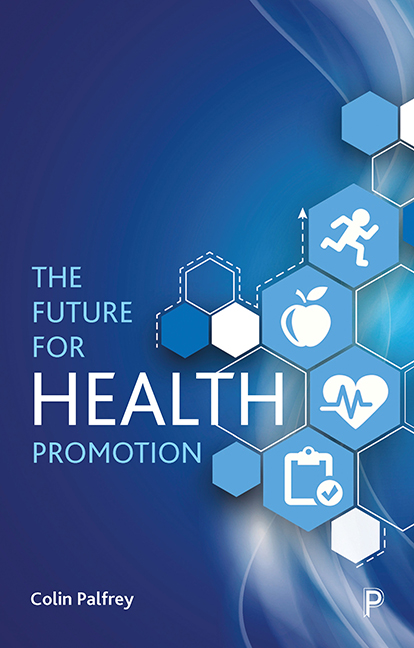Book contents
- Frontmatter
- Contents
- List of abbreviations
- Acknowledgements
- one Main themes
- two The origins of health promotion
- three Evidence base and methods for evaluation
- four Strategies for health promotion
- five Health economics and health promotion
- six Health promotion and mental health
- seven International perspectives
- eight The future for health promotion
- References
- Index
six - Health promotion and mental health
Published online by Cambridge University Press: 12 April 2022
- Frontmatter
- Contents
- List of abbreviations
- Acknowledgements
- one Main themes
- two The origins of health promotion
- three Evidence base and methods for evaluation
- four Strategies for health promotion
- five Health economics and health promotion
- six Health promotion and mental health
- seven International perspectives
- eight The future for health promotion
- References
- Index
Summary
Introduction
Methods of dealing with the problems of mental ill-health have changed considerably in the UK over the past 200 years. The former asylums so prevalent in Victorian times were places not centred on treatment but on containment and even punishment (Scull, 2016). Today, although there are several psychiatric hospitals in the UK, both NHS and independent, the emphasis is on therapeutic approaches towards enabling patients with challenging mental illnesses to return to the community.
In England, there are three secure hospitals – Broadmoor, Ashworth and Rampton – which house individuals detained under the Mental Health Act 1983. Most of these will have been referred by the courts because of serious crimes while others are there because they are considered to be a danger to the public and/or themselves. However, since the vast majority of persons suffering from a form of mental illness pose no threat to anyone, there has been a clear shift in government policy away from hospitalisation towards investment in care in the community. Much of this chapter, therefore, focuses on public health initiatives, including health promotion, that are intended to cure or, at least to help sufferers, their families and work colleagues to cope with the personal and social consequences of mental ill-health.
Mental illness
In their book on mental illness, Ramsay et al. (2001) list the main disorders that professional and family carers are likely to face. These are:
• schizophrenia and related disorder
• bipolar affective disorder, or manic depression
• depression
• anxiety
• obsessive compulsive disorder (OCD)
• post-traumatic stress disorder (PTSD)
• eating disorders
• drinking problems
• drug misuse and dependence
• personality disorders
• mental illness in older people
Within these disorders there are subcategories. For example, there are nine subcategories of personality disorders, including paranoid (suspicious, sensitive, argumentative, stubborn, self-important) and schizoid (emotionally cold, detached, humourless, introspective); eating disorders include anorexia nervosa, bulimia nervosa and binge-eating disorders, while ‘anxiety disorder’ includes panic attacks and agoraphobia.
The policy that informs health promotion programmes and projects aiming to prevent disease and promote physical health focuses on what are considered the main causes of preventable illnesses: overweight and obesity, smoking, alcohol misuse and lack of physical activity. Supporting the selection of these particular health behaviours is the clinical evidence that ischaemic heart disease, certain cancers and type 2 diabetes are the direct result of unhealthy lifestyles.
- Type
- Chapter
- Information
- The Future for Health Promotion , pp. 141 - 172Publisher: Bristol University PressPrint publication year: 2018



